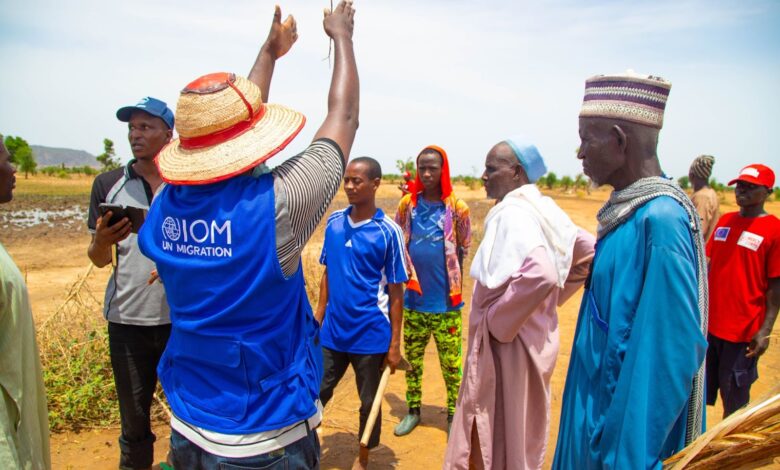IOM Reached Millions Of Nigerians With Humanitarian Support In 2023
The organisation recorded impact in various sectors, including camp management, data collection, health, livelihood support, migration, peacebuilding, sexual violence, and reintegration.

Last year, millions of Nigerians benefited from the International Organization for Migration’s wide range of programmes.
In its recently published annual report, the UN-related organisation provided a summary of its activities and key achievements.
“In 2023, our policy and programming efforts have been geared towards promoting a whole-of-government and whole-of-society approach. This has been crucial in fostering evidence-based solutions that enhance migration governance and strengthen the resilience of migrants and their communities,” said Laurent de Boeck, IOM Nigeria’s Chief of Mission.
The report showed that IOM recorded impact in various sectors, including camp management, data collection, health, livelihood support, migration, peacebuilding, sexual violence, and reintegration.
The intergovernmental organisation operates in a third of Nigeria’s states, including seven with a direct operational presence.
The beneficiaries of its programmes in 2023 include 1.4 million people who received humanitarian coordination assistance, over 419,000 people who resided in camps managed by the organisation, over 127,000 people who benefitted from water, sanitation and hygiene (WASH) services, over 126,000 people who received shelter support and non-food items, and over 121,000 people who benefitted from mental health and psychosocial support.
There were also thousands of people who received livelihood support, benefitted from peacebuilding interventions, and received reintegration or voluntary return assistance.
“IOM’s ERL [Early Recovery and Livelihoods] programmes restore economic activities, rebuild essential infrastructure, and enhance community resilience,” the report stated.
“ERL addresses the immediate and long-term needs of communities laying the ground for sustainable recovery and development. This includes providing income-generating skills such as vocational training and start-up grants, [and] rehabilitating public infrastructure through cash-for-work programmes.
“ERL programmes also include distributing climate-resilient agriculture kits (including seed inputs and seedlings), offering training on briquetting techniques, establishing and equipping production centres, forming cooperatives, and facilitating linkages with financial institutions.”
Its campaigns to raise awareness of safe migration practices reached over 6.5 million people via radio programmes, social media publications, and rallies.
In addition to these, IOM engaged with government stakeholders, civil society partners, and civilians to build needed capacity and improve policy frameworks.
Some of the government agencies it worked with were the Department of State Services (DSS), Federal Ministry of Labour and Employment, Federal Ministry of Humanitarian Affairs and Poverty Alleviation, National Agency for the Prohibition of Trafficking in Persons (NAPTIP), and National Commission for Migrants, Refugees and IDPs (NCFRMI). Others include the National Bureau of Statistics (NBS), National Drug Law Enforcement Agency (NDLEA), National Emergency Management Agency (NEMA), Nigeria Immigration Service (NIS), and National Population Commission (NPC).
It trained over 1,400 law enforcement officials on border governance and established four personnel training resource centres.
IOM continued to update its data on displacement and migration through the Displacement Tracking Matrix (DTM), surveying 3,860 IDP locations.
It was also last year the organisation conducted a household intention survey to provide a detailed understanding of the needs of internally displaced people and get their preferences regarding resettlement and integration.
Support Our Journalism
There are millions of ordinary people affected by conflict in Africa whose stories are missing in the mainstream media. HumAngle is determined to tell those challenging and under-reported stories, hoping that the people impacted by these conflicts will find the safety and security they deserve.
To ensure that we continue to provide public service coverage, we have a small favour to ask you. We want you to be part of our journalistic endeavour by contributing a token to us.
Your donation will further promote a robust, free, and independent media.
Donate HereStay Closer To The Stories That Matter




